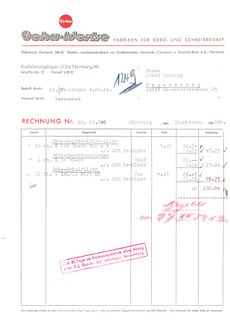Differenze tra le versioni di "Geha/en"
(Aggiornamento come da nuova versione della pagina di origine) |
|||
| Riga 4: | Riga 4: | ||
The company was founded in [[1918]] in Hanover by Heinrich and Conrad Hartmann, the name is short for ''Gebrüder-Hartmann'' (Hartmann brothers). The company was founded specializing in the production of material for stationery, especially paper, blocks, carbonless papers and tapes, becoming in the 20s one of the market leaders in stationery postal sales. | The company was founded in [[1918]] in Hanover by Heinrich and Conrad Hartmann, the name is short for ''Gebrüder-Hartmann'' (Hartmann brothers). The company was founded specializing in the production of material for stationery, especially paper, blocks, carbonless papers and tapes, becoming in the 20s one of the market leaders in stationery postal sales. | ||
| − | + | ''Geha'' entered the fountain pen market in [[1950]], with the production of economic pens made for the student market. The '50s pens were [[piston filler]] equipped with a special ink tank that allowed to maintain an emergency reserve. Later models passed to [[cartridge filler]], while maintaining the ink reservoir through the use of two separate cartridges, as for the [[Aurora]] [[Duo-Cart]]. In the '60s were produced [[inlaid nib]] models similar to those of [[Sheaffer]]. | |
| − | |||
| − | |||
<div class="mw-translate-fuzzy"> | <div class="mw-translate-fuzzy"> | ||
Versione delle 01:32, 25 nov 2020
| Geha |
|---|
| Pagine marca |
| Foto marca |
| Foglietti istruzioni |
| Altri documenti |
| Brevetti |
The company was founded in 1918 in Hanover by Heinrich and Conrad Hartmann, the name is short for Gebrüder-Hartmann (Hartmann brothers). The company was founded specializing in the production of material for stationery, especially paper, blocks, carbonless papers and tapes, becoming in the 20s one of the market leaders in stationery postal sales.
Geha entered the fountain pen market in 1950, with the production of economic pens made for the student market. The '50s pens were piston filler equipped with a special ink tank that allowed to maintain an emergency reserve. Later models passed to cartridge filler, while maintaining the ink reservoir through the use of two separate cartridges, as for the Aurora Duo-Cart. In the '60s were produced inlaid nib models similar to those of Sheaffer.
